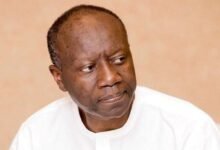
The Trade Union Congress (TUC) has reiterated its opposition to the privatisation of the Electricity Company of Ghana (ECG) while highlighting the challenges associated with it.
Despite drawing the attention of the government on the challenges the country may face in the prospect privatisation of the ECG, following the reading of the 2025 budget by the Finance Minister, the TUC said the government appeared to be “hell-bent” of completing the move.
Rather than privatisation of the ECG, the TUC calls for a strategic reforms including the non-politicisation of the ECG to help address its challenges.
The opposition to the privatisation of the ECG was contained in a statement on the 2025 budget and the economic policy of the government issued by the TUC and copied The Ghanaian Times yesterday.
“In 2017, in our submission to the then Akufo-Addo government in response to its first budget, we stated our opposition to the intended privatisation of the ECG. In that submission we served notice that the working people of Ghana and their union will resist any attempt by the government to privatise strategic state assets”, the statement said.
“In 2025, in our submission to the Mahama government, we reiterated our opposition to the privatisation of state-owned enterprises in all its forms and shapes. We further stated that in line with the resolution passed at the 10th Quadrennial Delegates Congress of TUC held in August 2016, we will resist any attempt to private ECG”, it added.
“Notwithstanding our opposition, government appears hell-bent on privatising ECG. The TUC and its affiliates remain resolute in our conviction that strategic reforms, including getting politics and politicians off the back of ECG is the only viable route out of whatever challenges the company faces. Our resolve to resist privatisation or private sector participation is at an all-time high”, the statement elaborated.
The TUC also touched on agriculture, microeconomic policy framework of the government and employment.
It said although the 2025 budget captured some initiatives such as the “Agriculture for Economic Transformation,” “Ghana Labour Export Programme,” and the “Women’s Development Bank” to help create employment and transform the economy, it failed to address the fundamental issues affecting employment creation in the country.
The Congress, therefore, underscored the need for the government to set regional and sector employment targets and also make resources available to the Ghana Statistical Service (GSS) and other agencies for data collection to help in the assessment of economic policies that was geared towards employment creation.
Moreover, the TUC urged the government to review GH¢2.9m budgetary allocation to the agriculture sector, since it was inadequate to address agricultural and food security challenges.
BY TIMES REPORTER







